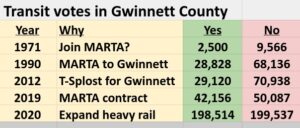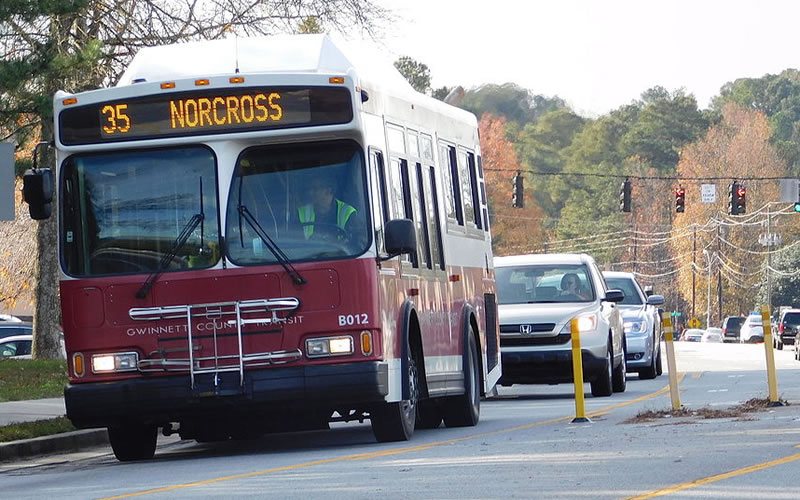By Elliott Brack
Editor and Publisher, GwinnettForum
JAN. 30, 2024 | Gwinnett County commissioners have signaled that they plan a vote on another transit plan in the fall of 2024. Therefore, let’s look back at the ways solving the transit problem has been approached in the past.
![]() Previous Gwinnett commissioners have been slow to approach rapid transit problems over the years because each time it is voted on, there has been significant opposition against it … .until the most recent vote, back in 2020.
Previous Gwinnett commissioners have been slow to approach rapid transit problems over the years because each time it is voted on, there has been significant opposition against it … .until the most recent vote, back in 2020.
In 1965 the Georgia General Assembly voted to create MARTA, the Metropolitan Atlanta Rapid Transit Authority, allowing a vote for the plan in the five core metro counties: Clayton, Cobb, DeKalb, Fulton, and Gwinnett. Cobb voters rejected participation, while the other four counties voted to be part of the overall Metro Authority.
In 1966 Georgia voters approved a constitutional amendment to permit the state to fund 10 percent of the total cost of a rapid rail system in Atlanta. Two years later, in 1968, Atlanta and MARTA’s core counties rejected a plan to finance MARTA through property taxes. In 1971—when the issue was presented to voters again—Clayton and Gwinnett voters dropped their support, and MARTA ended up being backed by only DeKalb, Fulton, and the City of Atlanta.
While moving people around crowded Metro Atlanta continued to be a problem with all the growth in the area, and seeing the fast growth in Gwinnett, local commissioners did little about transit for 19 years.
Finally, in 1990, now with 350,000 residents in the county by then, commissioners called for another transit vote. But long-term fears soon surfaced. In one pre-vote public meeting, newspapers quoted the tone of those at the meeting:
“That place,” one man said, referencing the state’s capital, “has a reputation for murder and rape — the wrong people. We don’t need ‘em, we don’t want ‘em.”
Said another: “Do we really want a direct line for the drug dealers at Five Points to get new markets among our fourth-and fifth-graders?”
The upshot was seen in the vote: only 29 percent of Gwinnetians voted for joining MARTA in 1990.
 Another 22 years would pass before the county put the transit issue to voters. This was in 2012, when the county proposed a one percent sales tax for transportation. By then, nearly 500,000 more people had moved to Gwinnett. But the 2012 vote tally was very similar to 1990: again 29 percent rejected MARTA coming to Gwinnett.
Another 22 years would pass before the county put the transit issue to voters. This was in 2012, when the county proposed a one percent sales tax for transportation. By then, nearly 500,000 more people had moved to Gwinnett. But the 2012 vote tally was very similar to 1990: again 29 percent rejected MARTA coming to Gwinnett.
Now we come to 2019, and another proposal for Gwinnett to enter into a contract with MARTA for transit services. This time the vote was closer, 40 percent approving MARTA, but again, another vote against traffic.
The last vote on transit in Gwinnett was in 2020, when there was a proposal to expand heavy rail to the county, but not to join MARTA. This vote was razor thin, 198,514 for the plan, but 199,537 against it. Another transit vote lost.
What’s different about the transit proposal Gwinnettians are expected to come before them in November, 2024?
There are significant elements: first of all, there is no tie at all to MARTA. The proposed one cent for transportation will be for expansion of a Gwinnett transit system, not tied to the Atlanta system except through connections.
Secondly, and this is significant, the Legislature has changed transit votes in Georgia so that sales taxes on such votes can be collected over 30 years, allowing counties to plan significant long-range improvements. Previously, the collections could be over five years, not allowing funding for long-term solutions.
Now, what’s your view on this anticipated transit vote for Gwinnett?
- Have a comment? Send to: elliott@brack.net











Follow Us